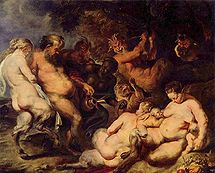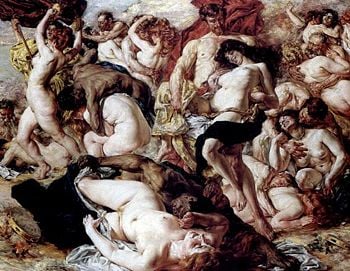Bacchanalia
| Bacchanalia | |
|---|---|

| |
| The Bacchanal by Peter Paul Rubens | |
| Observed by | Ancient Romans |
| Type | Pagan, Historical |
Bacchus
<something here!>
The Bacchanalia
The bacchanalia were wild and mystic festivals of the Roman god Bacchus. Introduced into Rome from lower Italy by way of Etruria (c. 200 B.C.E.), the bacchanalia were originally held in secret and attended by women only. The festivals occurred on three days of the year in the grove of Simila near the Aventine Hill, on March 16 and March 17. Later, admission to the rites was extended to men and celebrations took place five times a month. According to Livy, the extension happened in an era when the leader of the Bacchus cult was Paculla Annia - though it is now believed that some men had participated before that.
Livy informs us that the rapid spread of the cult, which he claims indulged in all kinds of crimes and political conspiracies at its nocturnal meetings, led in 186 B.C.E. to a decree of the Senate—the so-called Senatus consultum de Bacchanalibus, inscribed on a bronze tablet discovered in Apulia in Southern Italy (1640), now at the Kunsthistorisches Museum in Vienna—by which the Bacchanalia were prohibited throughout all Italy except in certain special cases which must be approved specifically by the Senate. In spite of the severe punishment inflicted on those found in violation of this decree (Livy claims there were more executions than imprisonment), the Bacchanalia survived in Southern Italy long past the repression.
Modern scholars hold Livy's account in doubt and believe that the Senate acted against the Bacchants for one or more of three reasons. First, because women occupied leadership positions in the cult (contrary to traditional Roman family values). Second, because slaves and the poor were the cult's members and were planning to overthrow the Roman government. Or third, according to a theory proposed by Erich Gruen, as a display of the Senate's supreme power to the Italian allies as well as competitors within the Roman political system, such as individual victorious generals whose popularity made them a threat to the senate's collective authority.
Quotations to use
Their most direct "descendant" was, of course, the Roman Bacchanalia, a festival characterized by legendary levels of excess. As described by the Roman historian Livy:
- When conducted under Roman auspices, the festival had earlier been confined to women, but in the grove of Stimula young men were being initiated into the cult, and there were allegations of both heterosexual and homosexual licence. Though previously restricted to three days a year, the ceremonies were now being conducted five times a month; moreover, the proceedings were being held in darkness. Allegations of dire misconduct were circulating, including charges of murder of unwilling initiates, forging of the wills of the dead, and perjury.[1]
Cicero, De Legibus II.8 <does this help make the case?>
- Let men approach the gods with purity---let men appear before them in the spirit of devotion---let men remove riches from their temples; whoever does otherwise shall suffer the vengeance of heaven---let no one have private gods---neither new gods nor strange gods, unless publicly acknowledged, are to be worshiped privately---let the temples which our fathers have constructed in the cities, be upheld---let the people maintain the groves in the country, and the abodes of the Lares---let men preserve the customs of their fathers and of their family---let the gods who have been accounted celestial be worshiped, and those likewise who have merited celestial honors by their illustrious actions, such as Hercules, Bacchus, Aesculapius, Castor, Pollux, and Quirinus. Let due honor be likewise paid to those virtues, by which man is exalted to heaven---as Intelligence, Valor, Piety, Fidelity; and let temples be consecrated to their honor---with regard to the vices, let no sacred sacrifices be paid to them.
- Let men put aside all contentions of every kind on the sacred festivals, and let servants enjoy them, their toils being remitted, for therefore they were appointed at certain seasons.---Let the priests duly render the public thank-offerings to heaven, with herbs and fruits, on the sacrificial days. Also, on the appointed holidays, let them offer up the cream of milk, and the sucklings; and lest the priests should commit any mistakes in these sacrifices, or the season of these sacrifices, let them carefully observe the calendar, and the revolutions of the stars.---Let them provide those particular victims which are most appropriate and agreeable to each particular deity.---Let the different gods have different orders of priests.---Let them all have pontiffs in common; and let each separate god have his Flamen.
<more on Cicero here: [1]>
Modern usage and trivia
The term bacchanalia has since been extended to refer to any drunken revelry. In A Tale of Two Cities, Charles Dickens uses the phrase "the law was certainly not behind any other learned profession in its Bacchanalian propensities."
- Within the philosophy of Hegel, a Bacchanalian revel is used within the Preface, paragraph 47.[http://www.marxists.org/reference/archive/hegel/works/ph/phprefac.htm
- San Diego has a venue called Bacchanal Club, where live bands perform.
Representation in the arts:
- One of the best-known melodies from Camille Saint-Saëns's 1877 opera Samson and Delilah is the Bacchanalia.
- Bacchanalia is also a highly-regarded Atlanta restaurant by owner-chefs Anne Quatrano and Cliff Harrison, located in a former meatpacking plant.
- Bacchanalia and Bacchanal is the term used to describe the drinking, dancing and general revelry associated with Trinidad and Tobago's annual carnival.
- Bacchanalian is also a Montreal-based rock band.
- A Bacchanal is held in Donna Tartt's book The Secret History, and is a pivotal plot device allowing a justification of the pre-defined murder.
- Bacchanal is the title of the fifth track from the Clutch album, Transnational Speedway League: Anthems, Anecdotes, and Undeniable Truths.
- A Brief Tutorial In Bacchanalia is a song by Fear Before The March Of Flames
- The term is used in the second line of alternative rock band Third Eye Blind's song "Faster," which is track one of their third studio release Out of the Vein.
See also
- Maenad - female worshipers of Dionysus
- Dionysus - Greek version of Bacchus
- Thriambus - a hymn sung in processions in honor of Dionysus
- Dionysian Mysteries
- Roman Senate - political body responsible for suppressing the Bacchanalia
- Fear Before the March of Flames - for having a song titled "A Brief Tutorial In Bachanalia"
- Eros Day A Modern Bacchanalian-Style Holiday Celebrating Eros
Notes
- ↑ Livy, summarized by P. G. Walsh, "Making a Drama out of a Crisis: Livy on the Bacchanalia," Greece & Rome (2nd Series), Vol. 43(2) (October 1996), 188-203. 188.
ReferencesISBN links support NWE through referral fees
This article incorporates text from the Encyclopædia Britannica Eleventh Edition, a publication now in the public domain.
- Euripides "Bacchae": a Greek tragedy that gives some insight as to what was involved in a Bacchanalian rite.
External links
- Senatus consultum de Bacchanalibus in Latin at The Latin Library. Retrieved December 19, 2007.
- Senatus Consultum de Bacchaniabus in English and Latin at forumromanum.org. Retrieved December 19, 2007.
- Description of the Bacchanalia and the Senate's ruling from Fordham. Retrieved December 19, 2007.
Credits
New World Encyclopedia writers and editors rewrote and completed the Wikipedia article in accordance with New World Encyclopedia standards. This article abides by terms of the Creative Commons CC-by-sa 3.0 License (CC-by-sa), which may be used and disseminated with proper attribution. Credit is due under the terms of this license that can reference both the New World Encyclopedia contributors and the selfless volunteer contributors of the Wikimedia Foundation. To cite this article click here for a list of acceptable citing formats.The history of earlier contributions by wikipedians is accessible to researchers here:
The history of this article since it was imported to New World Encyclopedia:
Note: Some restrictions may apply to use of individual images which are separately licensed.
